Hamish McLachlan: How Winter Olympics gold medallist Jakara Anthony beat her ‘crippling’ fears
With a Winter Olympics gold medal, Barwon Heads local Jakara Anthony is the best female moguls skier in the world. But her rise to the top has been ‘riddled’ with fears and tears.
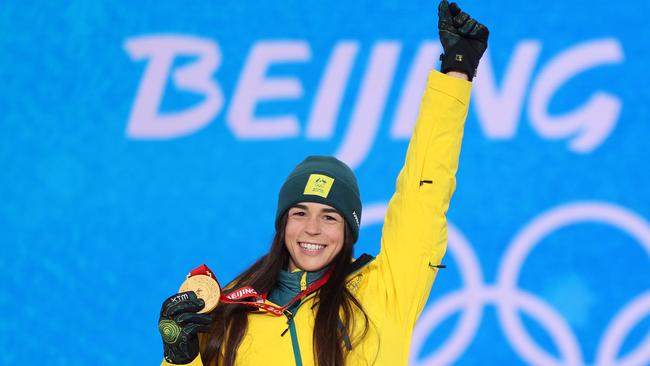
Victoria
Don't miss out on the headlines from Victoria. Followed categories will be added to My News.
Jakara Anthony went to her first Olympic Games as a 19-year-old. She finished fourth in the moguls. Four years on, at her second Winter Games, she has just left with an Olympic gold medal, having shown the world she is the most dominant female mogul skier in the world.
Jakara was born in Cairns, lives in Barwon Heads and is a low key, humble Aussie who loves to surf. But it hasn’t all been easy. She has battled through self-doubt and anxiousness and hidden tears along the way.
HM: Jakara, if it wasn’t for the snow, you wouldn’t be born?
JA: Yeah, you could put it that way. Mum and Dad met at Mt Buller when they were both skiing. Our family started there, and we’ve done the full circle because when my brother and I finally got to school age, they started us at the primary school up there during the winter. We got exposed to all the winter sports there are. That was the beginning.
HM: Term three?
JA: Yeah, exactly. I would do the bulk of the year at home in Barwon Heads, and do term three at the primary school at Buller. My brother and I would go there. You get to do school skiing on a Friday and go skiing on weekends. It’s a cool life and that’s where the dream starts, I guess.
HM: How old were you when you first put on a set of skis?
JA: I was four when I first started skiing. By the time I was eight I was doing absolutely everything, especially at interschools, which is how Australians are exposed to most of the Olympic disciplines. You get to compete in moguls, ski cross, alpine, border cross, cross country.
HM: How do you end up specialising in moguls?
JA: It just stood out to me as ‘the one’. I think the fact that every run is different keeps it very challenging and exciting. I’m a bit of a perfectionist and there’s a lot of different skills that go into mogul skiing. You have the turns and the jumping and the speed - there are so many different technical aspects. Trying to get them all perfect really appealed to me.
HM: For the moguls you need to be an unbelievable skier, but also an extraordinary aerialist. How many times do you think you’ve been up in the air and landed in a reasonable amount of pain?
JA: Well, I could count it on both my hands, luckily, and not have to use my toes. It does go wrong sometimes. When I was younger, that led to a lot of fear. I had couple of backflips where I landed on my face as a youngster, and I struggled with fear a lot after that.
HM: How badly?
JA: Terribly badly. There is a water ramp facility about two-and-a-half hours from my house, and Mum would drive me there for training. We’d get there and I’d be so terrified I wouldn’t be able to get out of the car. On the third day of driving there, I finally got out.
HM: You would drive to Lilydale, do two-and-a-half-hours in the car from Barwon, get there, be too scared to get out and jump, so you’d turn around and drive all the way home again? A five-hour round trip?
JA: Yep. It seems insane, but it shows you the power of the mind.
HM: How old were you when that was happening?
JA: 14.
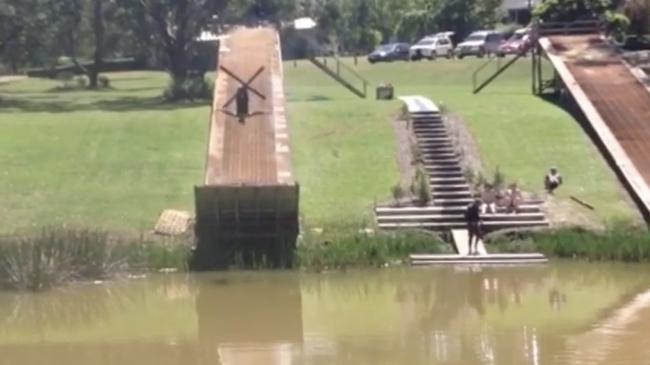
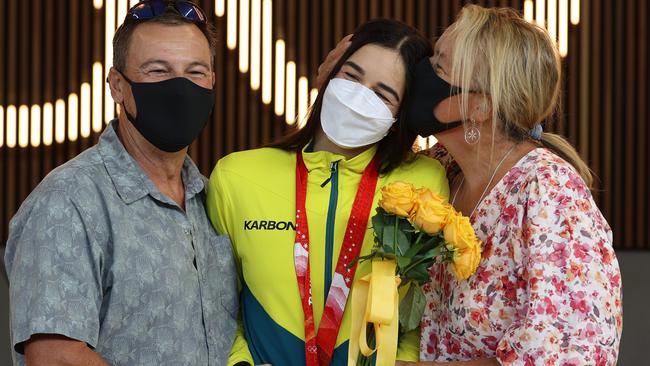
HM: And you make a world cup debut two years later?
JA: Yep. It’s wild. Up until 2019, I wouldn’t even do a backflip on snow without having my coach there on the jump with me. I was too scared. It was something I struggled with. Over the last year we have worked on some mental skills to overcome that and got to the point where I know I can challenge that fear. That’s where I’m at today.
HM: You say until 2019. A year earlier you had finished fourth at the Olympics. That was all with no confidence, not wanting to do jumps really at all?
JA: Pretty much. I struggled a lot with confidence in myself and in my capabilities. At that Olympics, I would stand behind my coach on the side of the course leading up to the start of that season, too crippled with anxiety and fear. Even at the Games, before Q2, I was bawling my eyes out.
HM: In PyeongChang?
JA: Yeah. At the Olympic Games. Completely terrified.
HM: That’s unbelievable – riddled with fear and anxiety and uncertainty?
JA: It sounds odd saying it, but that’s what was happening. I haven’t spoken about it before. On finals day, I was so worked up. I was scared and anxious, not confident in myself at all. I had a bit of a meltdown.
HM: What was the anxiousness, the fear and the self-doubt manifested from?
JA: Some of it is because there’s a big physical risk in our sport, it’s an extreme sport. There are big consequences if things go wrong. Some is to do with the lack of confidence I had in myself, from previous experiences of things going wrong, and then a bit of performance anxiety too. As I said, being a perfectionist, that has worked in my favour a lot – and then, it has worked against me.
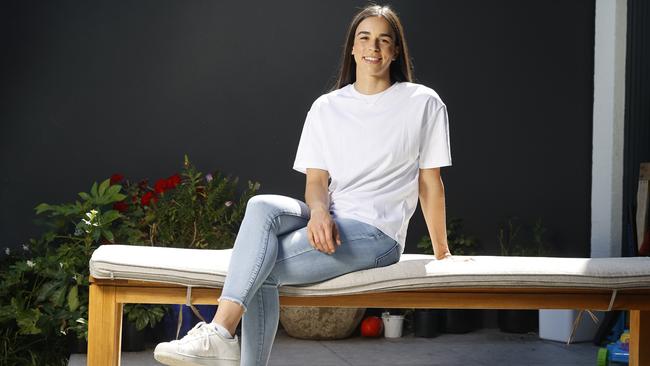
HM: Does the fear and the anxiety come from one specific moment, or does it creep in over time? I would assume the longer you do it, the better you get, the less anxious, but that’s clearly not the case given you started at eight, got into a world cup at 16, and you’re at an Olympics, terrified.
JA: It’s a good point. I haven’t really spoken about it before, so let me try and articulate it well. I guess it was mostly to do with the lack of confidence in myself. I had people around me who believed in me so much, but I didn’t believe enough in myself much at all.
HM: Why?
JA: I’m not so sure – self-doubt just crept in. After the PyeongChang Olympics, I came away with fourth place after having skied a run I was proud of. That was a big confidence boost for me. For the next four years, the plan from my team was to be the best that I could be. We put a strong plan in place for that first year on the world cup tour, and we focused on achieving skiing goals, and the whole season, even at the events, the focus was on training, trying to progress myself as much as possible. That was the first season where I really saw success. For the entirety of that next season, my worst result was a fourth. That was spectacular!
HM: But?
JA: But then I started to get performance anxiety because I started focusing a bit more on the results and not the process. The more I focused on the results, rather than the process, the more I saw a decline in the performance. And then after that, I let the results have too much of an impact on me. I worried about the results, and then it became a negative spiral.
HM: You are on top of the mountain in PyeongChang at the Olympics, crying in between runs. Self-doubt riddled your body, your mind, still needing to be consoled by your coach, and you end up fourth in the world … but then … still doubt yourself?
JA: For a period after that I didn’t doubt myself so much, but there was still not as much confidence there as I would have liked.
HM: Between 2018 and ’22, the view was you’d become a much more confident, much more bullet-proof aerialist. But seemingly that’s not what happened internally, that was only an external view.
JA: What was happening internally and what people were seeing were two very different things. I’m sure if you’d been at training, you would have seen glimpses of that. I was hiding what I was feeling. I was trying to show a bullet-proof performer to the world, but that wasn’t really the case.
HM: Hiding the fear and terror?
JA: Yeah. There were training sessions after those Olympics where I wouldn’t ski, I’d just stand behind my coach on the course, waiting for him to reassure me that everything was okay. I wasn’t in a place where I was confident enough nor believed in myself enough to do the run.
HM: This is in the last few years in between world cup events, where you were too scared to train?
JA: Yeah. When I started to let results have an impact on me and what I was doing and feeling, I hit a low point, and I was questioning myself, and the sport, and wasn’t training how I wanted to. The first season we skied with Covid, the 2020-21 season, I don’t think I skied a single run in competition at my full potential.
HM: What did you change to become who we saw in Beijing?
JA: I changed how I viewed things. The last 12 months have been very different. I have become confident in myself. We made a big push to work on the mental side of things, getting more and more belief in myself. That has really showed in these last 12 months, and I’m a happier and far more confident person because of it. That’s the greatest thing that has come out of this whole Olympic journey. For me to become a strong person with a sense of belief and purpose.
HM: Now, talking a week after you have become the most dominant moguls gold medallist in the history of the sport, because no one has ever led from qualifying throughout, are you completely confident in your ability? Or does your mind get the better of you every now and again?
JA: I still have my doubts at times, but I’m much better at managing that and challenging my fears. I still get scared every day at training, but I know I’m a capable skier.
HM: It’s hard to believe; do you think that will ever go away?
JA: I’ll always be scared. If you are skiing in your comfort zone, you’re taking it too easy.
HM: You’re scared, but you love it?
JA: 100 per cent. I don’t love the feeling of being scared, but the feeling when you are able to overcome the fear is a cool one. A sense of bravery and accomplishment and success.
HM: How long can you continue to be scared, but be brave enough to continue to overcome it?
JA: Right now, I have some good skills to manage it. I’m in a better place. I am confident, I believe in myself, I’m a lot happier, I could go on for quite a while. There’s still a lot more to come, but after putting a solid 12 months of work together, I have some skills that are going to stay with me for life.
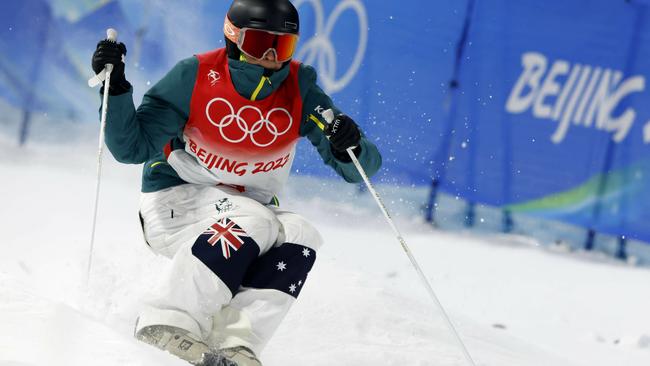
HM: How has life changed since you’ve become an Olympic gold medallist?
JA: Well, I don’t know yet because I haven’t seen anyone, or done anything … I’m trying to avoid Covid! I fly out again soon. It has been incredible to see how much of an impact this has had on the community back home, and how it has inspired people. We talk a lot about how medals inspire people, and it’s been a unique and special experience.
HM: Has there been a moment that has blown you away?
JA: So many moments. The opportunities this opens up for me is incredible and hopefully it creates opportunities for people in the future. I have benefited a lot off the success of our past athletes, like Alisa (Camplin) and Lydia (Lassila). We have the new water ramp facility thanks to them. Not only will this change things for me, but it will change things for a lot of people in the future.
HM: It’s a unique club. Australia has 26 million people in it, and there are just six winter Olympic gold medallists.
JA: I didn’t realise it was so few until Lydia Lassila told me I was the sixth gold medallist, and the first in 12 years. It blew my mind. Those five other athletes are people that I absolutely idolise, so to have my name alongside them is surreal.
HM: Who caught your eye initially? Who was the first Winter Olympian, or what was the first Winter Olympic moment where you thought, ‘I’m going to do that’?
JA: Growing up, I read Lydia’s and Alisa’s books, but the first moment was Britt Cox in Vancouver 2010. I would have been 11 at the time. Watching her, I realised, that’s me. That’s what I’m going to do.
HM: Amazing to think that the girl that you idolise becomes a teammate four Olympics later.
JA: I’ve been to two Olympics with Brit, countless world cups, world championships. I’ve seen her win world championships and take out a crystal globe. It’s been really cool to share the journey with her.
HM: Cameron Loftus, chief executive at Barwon Sports Academy, said on the first day you walked in you were shy, and quiet. Were there tears?
JA: Yes. That was just group training in a gym. It wasn’t anything out of the normal, just slightly overwhelming. I’ve always been shy and slightly daunted.
HM: So, how does the young lady who gets daunted feel just before the last run in the super final at the Olympics? As you stand there, is the shy girl from Barwon Heads aware that there are billions of people watching you, about to commentate on the run, and 26 million Australians with their fingers crossed?
JA: I was so in my own bubble that I didn’t know what was going on around me. I was so focused on what it was that I needed to be doing in that moment to give myself the opportunity to put down the run I knew I was capable of. That whole day, I didn’t see anyone else ski a run, I didn’t know what scores other competitors were getting, and I couldn’t fathom how many people were supporting back home.
HM: You didn’t worry about anyone else? You just focused on producing the best possible run you could?
JA: Exactly. I knew what I was capable of, and if I put down that run, I knew the result would take care of itself. No matter the outcome, I would be proud of what I was able to achieve. I just zoned in, and went about producing the best possible run I could produce.
HM: And it was golden. When you look back at it, there were only eight 80-plus scores throughout. Only five 81s. Of the five, four runs were yours. It was a complete domination.
JA: It’s cool when you put it like that.
HM: Better than cool. It’s ridiculous.
JA: It was pretty phenomenal to sit on top after every round. It shows how consistently I was able to ski at that top level. I was able to do it in competition a couple of times, but at those competitions, quite often I would struggle to put down in that last run and finished second to fourth. That was playing on my mind a little bit. But … I did it.
HM: You did it. You skied without any doubt.
JA: There wasn’t any doubt that day. I knew that myself and my team had done absolutely everything possible to be as ready as we could be. We couldn’t have done anything else. I can take a lot of confidence from that, knowing I was as ready as I was ever going to be.
HM: You land, you turn, and we see you looking at the screen. What did you think was going to flash up?
JA: I was so proud of the run, and I was sure that was it. I was going to be happy no matter what the result was. If anyone had beaten that run, I would have been so excited and proud of them, because it would have taken an awesome run.
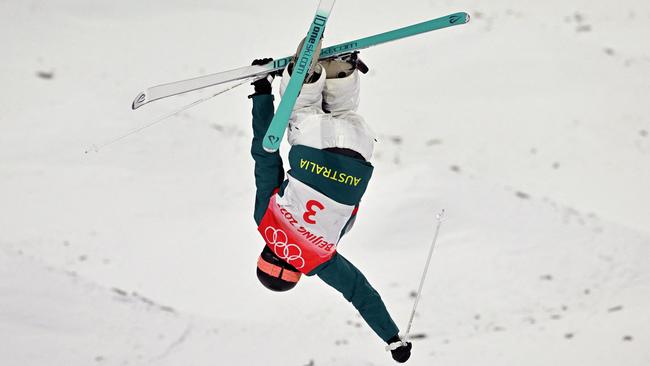
HM: You produced a cork 720 mute.
JA: Yep. It was big for me. It needed confidence as no woman had ever completed it in an Olympic competition before.
HM: That comes with a huge amount of risk, when it’s your last run, one run only — all other runs are discarded. Cut throat, no margin for error.
JA: It’s been a big project of ours the last couple of years. We have spent a lot of time at the water ramp doing it, and we are lucky to have a new facility in Queensland, the Geoff Henke Training Centre. Twelve years prior to that, it was just the muddy dam in Lilydale. Being there, we were able to train that jump, and it was an interesting lead up. We had big ambitions at the start of that year leading into the games; we wanted to get the cork 720 mute ready for competition. I broke my toe, so I missed a bit of jumping, then when I could jump, it was only a quarter of what I would normally do. It delayed me getting back onto the snow to jump. We finally got back on the snow in Perisher, and the resorts shut down because of Covid. Things kept getting in the way, and these are things that would have really unhinged me in the past, but with the new skills I had mentally, I was able to make every jump count, which is important.
HM: How many times do you think you had done the jump pre-competition?
JA: Hundreds.
HM: Who has the discussion?
JA: My coach, Pete McNeil and I were keen to push the sport, and we knew I had the capability. It was a big goal of ours. We knew I had the jumping capabilities, and we think it’s important to push the women’s side of the sport. The women’s field has seen such a big jump in the degree of difficulty, so to be a part of continuing to push that is cool.
HM: What happens now? You go back onto the tour until the end of the northern hemisphere season?
JA: We head back to Europe soon, there are three more world cups in Italy and France, so we’ll head over for some training and competition.
HM: Is it a lonely existence, something you love, or a combination of the two?
JA: I love it. It is difficult at times. I’m not as close to people at home as I used to be, and I don’t get to see them as much, especially with Covid. Every time I was home, I couldn’t really go and do anything or see anyone. The time I would lose out of training if I was to get Covid would be too large. For me, it wasn’t worth the risk. That was the decision I made, but everything has been worth it. I wouldn’t change it for the world.
HM: There’ll be plenty of coffees later. When you’re home, what do you love doing?
JA: I love getting back to Barwon Heads and going out for a surf, spending time outside cycling, playing tennis and enjoying the weather. I obviously miss spending time with my family so going out to dinner or getting takeaway and eating at home with them is something I look forward to.
HM: What’s your takeaway order?
JA: I usually go for a Simon Says burger from Grill’d.
HM: Best surf break you’ve surfed in Australia?
JA: I love going to Noosa and surfing off the point there.
HM: If you weren’t allowed to go to the snow anymore, you’d like to become an irukandji, and surf with Sal Fitzgibbons and Steph Gilmore?
JA: That’s the dream. It would be awesome. I haven’t met either but I sort of have a girl crush on the whole women’s tour on the WSL.
HM: Dogs. How are we going to address this one with dad? You want a puppy?
JA: I do, but as I speak to you, there are no puppies barking around here yet, so it’s yet to show up.
HM: How has the conversation gone?
JA: “You’re not getting a dog.”
HM: That’s very blunt.
JA: No sugar coating. The reality is I’m never home, and my parents are never home. We move out of our house every summer, rent it out and move into a caravan. We have done that since I was eight. The money they get from renting allows them to afford our skiing and activities. I don’t think dogs are allowed at the caravan park.
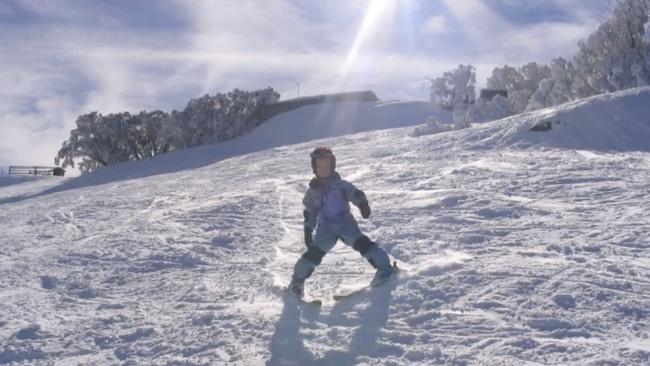
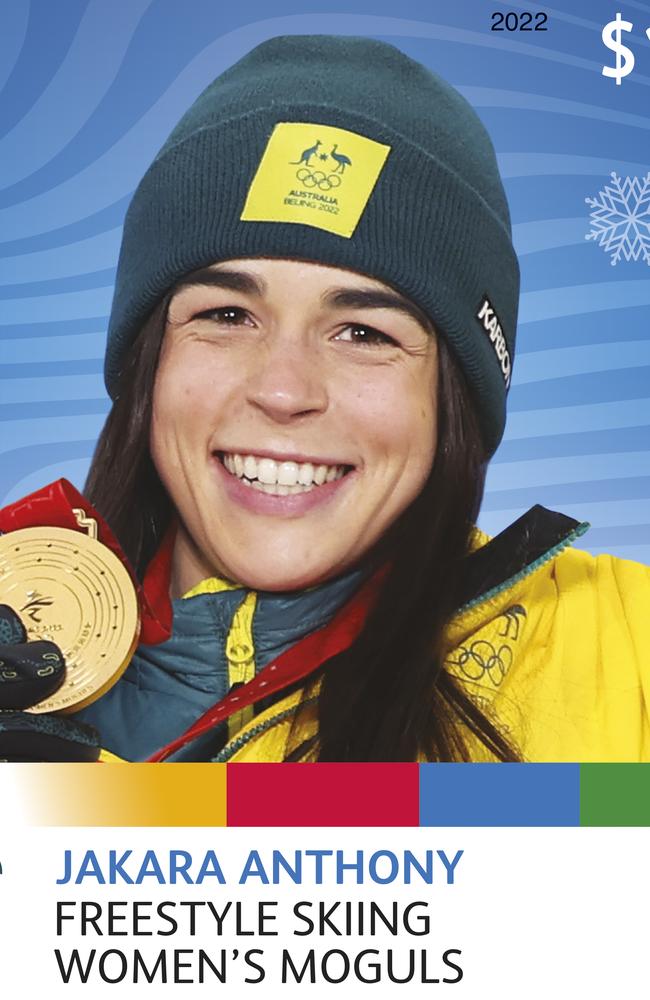
HM: Do you find it surreal that kids like mine are begging to stay up late at night to watch you, and at the end of watching you, say, ‘I want to become an Olympic skier’?
JA: That’s the best thing that comes out of it: other kids, other people, being inspired to go out there and chase their dreams. Dream big. If I can be that person for someone else, that means the world and it’s all worth it.
HM: Who did you want to meet in Beijing that you did or didn’t get to meet?
JA: I walked past Shaun White in the hallway. I said ‘hi’, but I kept walking. I would love to have met Ester Ledecká, who won gold in PyeongChang in the snowboard event and the ski event.
HM: That doesn’t make sense, does it?
JA: Completely mind blowing.
HM:You know there are lots who want to meet you.
JA: That’s cool to think about.
More Coverage
Originally published as Hamish McLachlan: How Winter Olympics gold medallist Jakara Anthony beat her ‘crippling’ fears




